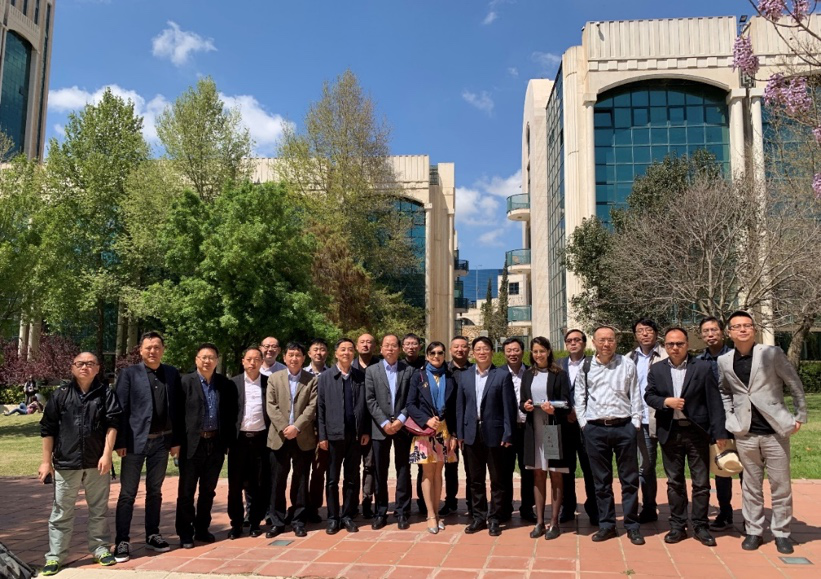| Position: Home > News Center > Company News |
| JAISTC Organized a Study Tour to Israel--Known as the 'Startup Nation(April 2019) |
| Publish Time:2019-04-21 |
|
To promote our province's technology business incubators and high tech enterprises actively participating in the "Belt and Road" initiative, explore opportunities and models for cooperation in both "bringing in" and "going out” Additionally, to learn from the advanced experience in park management from developed countries, a delegation of 21 members organized by JASTC visited Israel from April 8 to April 20, 2019. During the visit, they engaged in learning, training, and cooperative exchanges. 1.Mission and Content of the Study Tour: 1.1 The delegation's first stop was a visit to the National Innovation Authority in Jerusalem, Israel Innovation Authority promotes the exchange and cooperation of Israel’s companies with those of other countries. It serves early-stage startups, mature companies involved in developing new products or manufacturing processes, Israeli companies seeking new overseas markets.
1.2 MATAM Technology Park, located in Haifa, Israel's third-largest city, is the largest and oldest technology park in Israel. Many internationally renowned high-tech companies, such as Intel, Microsoft, Google, Philips, Qualcomm, Zoran, and IBM, have subsidiaries here for production and research and development. 1.3 Weizmann Institute of Science and Yeda Technology Transfer Company: The Weizmann Institute of Science, formerly known as the Sieff Institute, was established in 1934 and named after Israel's first president, Prof. Chaim Weizmann. The Weizmann Institute currently has over 2,500 researchers engaged in various fields such as mathematics, computer science, physics, chemistry, and biology. In 2011, it was ranked as the world's top research institute by SCIENCE magazine.
1.4 A visit to NET.WORK, located in the Ramat Gan region of Israel. It is the largest government-owned technology business accelerator in Israel, targeting female entrepreneurs, entrepreneurs above the age of 50, and young entrepreneurs (aged 14-18). It also provides citizens with a 15% rent discount. 1.5 A visit to Ben-Gurion University which located in the heart of the Negev Desert. It is one of Israel's leading research universities and is a leader in various fields globally. The university's main faculties include natural sciences, engineering, and desert research, cyber security is their strength. 1.6 A visit to the Ben-Gurion University Technology Park, a strategic project jointly developed by Ben-Gurion University, Beersheba City Government, and the American company KUD. The park is home to top networking companies, multinational enterprises, cutting-edge academic research institutions, leading technology defense groups, and special education platforms. 1.7 A visit to the JVP incubator in Beersheba, full name Jerusalem Venture Partners, which manages a $1.1 billion Israeli top venture capital fund. In its 23-year history, JVP has invested in over 120 projects with a carefully crafted approach, resulting in 12 of them being listed on NASDAQ, achieving a 10% IPO rate for its investment portfolio. 2.Main Gains from the Visit: 2.1 The study tour was enriching and filled with diverse activities, receiving full recognition from the delegation members and high praise from the host country. The selection of visit points covered various types, including government department, research institutions, universities, parks, incubators, and start-up enterprises which gave some project roadshows and successfully facilitated commercial matchmaking. 2.2 Tailoring Industrial Distribution to Local Conditions: In Israel, technology-based startups are mainly concentrated in the economic center of Tel Aviv, leading to overly centralized distribution. As a response, they invested in building the internationally competitive Ben-Gurion University in the Negev Desert region. This investment included the development of supporting projects, such as parks, incubators, hospitals, and residential areas. This strategic positioning rapidly transformed the area into the country's and even the world's center for information and network security research and development. 2.3 Government Support for Entrepreneurship: Over two-thirds of the professionals in the high-tech industry are adult males in Israel. To encourage more diversity in entrepreneurship, the government implemented policies in state-owned incubators that offer rental subsidies to female and young entrepreneurs and provides them with more business opportunities. 2.4 Government-Funded Tolerance for Failure: In Israel's philosophy, the experience of failure is also a valuable resource. Government-backed incubators provide startups with 85% (ranging from $500,000 to $2 million) of the initial funding and a 2-year entrepreneurial coaching program to help companies quickly become self-sufficient. If successful in raising funds in the market later, the government will deduct 3 to 5% of the company's revenue as a commission, but there is no obligation to repay if the company fails. 2.5 Serving as a Bridge to Facilitate Implementation: The government introduced market competition mechanisms to facilitate communication and cooperation between the academic and industrial sectors. Under this mechanism, research and development achievements undergo market-driven competition, allowing the best ideas to emerge and become acquisition targets for new startups or other companies. Israeli government recognized the country's shortcomings in industrialization and actively sought cooperation with countries with a higher degree of industrialization, especially large markets like the United States and China, thus serving as an effective bridge for Israeli technology projects to take root and succeed abroad." |

